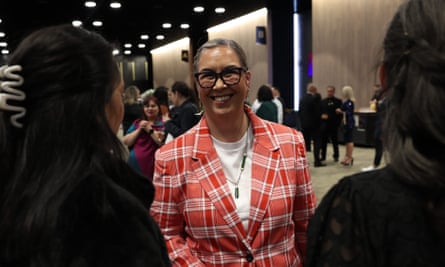New Zealand’s Māori language commissioner has described government policies to limit the use of the Indigenous language in the public service as “a risk” to the half-century effort to revive it.
“Any affront to the efforts that we have been making has to be taken seriously,” the commissioner, Prof Rawinia Higgins, told the Guardian. “We’re seeing a reaction – only from a small corner of people, but enough that we don’t want that to snowball.”
This year Māori language week, held in September, comes at a time of fractious relations between Māori and the coalition government over its policies, which includes measures Māori leaders have said relegates the language, known as te reo, to a second-class status.
Since being sworn in last December, several government ministers have ordered their departments to stop using Māori names. Other ministries have asked staff to stop using te reo Māori in briefing papers and to communicate primarily in English, while others have stopped funding language courses for staff.
One of the government’s coalition partners, NZ First, also plans to introduce a bill to make English an official language, despite it already being the main language in New Zealand.
The prime minister, Christopher Luxon, insists he is a supporter of te reo, and has been taking taxpayer-funded lessons.
“In New Zealand we’re lucky to have this language and I’m glad to celebrate it,” he wrote in a Facebook post. He has insisted his government’s policies are instead about making the public service easier to understand.

But Higgins warned the policies had sent a worrying message about the language’s status in society.
“A lot of those policies are not predicated on a language revitalisation strategy. Giving it prominence, it signals status,” she said. “It’s not a threat to English by any sense of the imagination. It says, ‘OK, my language is seen as important.’
“We’ve brought the language back from the brink. Despite whatever affronts there may be, we’ve got to continue.”
Luxon’s office and the minister for Māori development, Tama Potaka, did not respond to requests for comment.
Harsh assimilation policies in the early to mid-20th century – which saw some children face corporal punishment for speaking Māori – saw the language nearly wiped out. Government surveys in the early 1970s showed fewer than 5% of Māori children were able to speak it, with elders holding real fears for its extinction.
In 1972, a petition by university students triggered a protest movement that led to what’s widely known as the “Māori renaissance”, which saw the emergence of Māori immersion schools and broadcasting, as well as the recognition of Māori as an official language. Today, one in five Māori are able to speak the language with some level of proficiency.
Modelling published this month by Michael Miller, a PhD candidate at research centre Te Pūnaha Matatini, found that around one in 25 New Zealanders now have some level of proficiency in the language.
Enrolments in tertiary te reo Māori courses had increased by 93% over the past 10 years, Miller said, with both Māori and non-Māori showing interest.
“There is enough momentum in the community for te reo Māori to keep growing but if the policy settings continue in the long term, they could have a negative effect”.
Dr Rachael Ka’ai-Mahuta, the project’s co-lead, said the research aimed to develop evidence into what would be the best possible interventions and resources for Māori revitalisation.
“I don’t believe in the death narratives around te reo Māori – I think it has a bright future,” she said.
While the government is pushing policies to limit the language in the public service, te reo Māori has never been more popular. There are extensive waiting lists for classes, Māori songs often top the charts, Hollywood studios are releasing versions of movies in Māori, and last week Māori language week merchandise sold out in 10 minutes.
Several Māori words that have become mainstream were also included in the Oxford dictionary of New Zealand English last week, including mahi (work), tikanga (customs), and waka jumping, a political term used when someone changes parties, which translates to changing boats.
However, Higgins warned the language “hasn’t passed a tipping point where those gains can’t be lost”.
“Our language revitalisation efforts started with protesting. I think it’s fair to say some of the campaigns that have come out have pushed back against our efforts. This is a rallying call to remind people that we’re still on this journey.”
Ultimately, Higgins said she was confident that any opposition was from a small sector of society. To those people, she said there was nothing to fear.
“It’s a defining marker of who we are as a country,” she said.
“As much as people might want to say that we’re about rugby and sheep, I mean, we’re not the only country that plays rugby; we’re not the only country with sheep. But we are the only country where te reo Māori is the first language, and we need to embrace that.”
Source: theguardian.com


